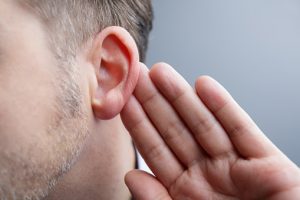 Hearing loss is often associated with deafness or a total inability to hear, but in most cases, people with hearing loss are not deaf—they can hear some sounds, but not all or not in all settings. Hearing is very subtle; we take the auditory aspect of our existence for granted, and even if we cover our ears with our hands or use ear plugs, we can still hear some of the outside noises. Because it’s very hard to shut off this sense completely (like you can with vision by simply closing your eyes), we don’t always think about our hearing as something that can gradually deteriorate like the sharpness of our vision. Young or old, we think that you can either hear or you’re deaf, when in reality there are many “in-betweens.”
Hearing loss is often associated with deafness or a total inability to hear, but in most cases, people with hearing loss are not deaf—they can hear some sounds, but not all or not in all settings. Hearing is very subtle; we take the auditory aspect of our existence for granted, and even if we cover our ears with our hands or use ear plugs, we can still hear some of the outside noises. Because it’s very hard to shut off this sense completely (like you can with vision by simply closing your eyes), we don’t always think about our hearing as something that can gradually deteriorate like the sharpness of our vision. Young or old, we think that you can either hear or you’re deaf, when in reality there are many “in-betweens.”
You may lose your ability to hear delicate sounds, like quiet whispers or the rustling of the leaves. Or, you may no longer be able to understand what someone is saying if there’s another conversation going on or music playing in the background. In some cases, people think they hear it all until they talk on the phone and realize that they can’t comprehend much without seeing the other person’s face, meaning they were reading their lips all along.
Hearing loss may be inherited
Advertisement
Similar to vision problems, hearing loss (again, not necessarily deafness—in most cases, it’s reduced quality of hearing) can be brought on by a number of common things. One is aging. As we get older, our body doesn’t function as efficiently and flawlessly as it used to, and some of these changes can impact the quality of our hearing. There are health-related causes, like ear infections, disease complications, and injuries that damage the structure of the inner ear, directly affecting its ability to process sounds. And then there are environmental factors, with prolonged exposure to loud noises being the most common example.
A health condition (any health condition) can be acquired or inherited. So far, we looked at cases of acquired hearing loss, but you may be surprised to find out that hearing loss can be inherited from your parents or passed down to your children. There are two types of inherited hearing loss. Syndromic hearing loss, which co-occurs with other conditions affecting other aspects of health—there are about 400 different syndromes associated with hearing loss in one way or another. The other type is non-syndromic hearing loss, which is not associated with other symptoms or conditions. The former accounts for 15 to 30 percent of cases of hereditary hearing loss, while the latter is associated with as much as 70 percent.
The child can be born with an affected gene, setting the stage for hearing problems some time in their life. Conversely, there may be other genetic issues that affect your hearing, such as otosclerosis (inability to amplify the sound) and Pendred syndrome, which is associated with hearing loss and troublesome thyroid function.
You can find out whether you carry a gene that predisposes you to hearing loss with a simple genetic test—either blood work or a cheek swab—scouting for 23 genes that are most commonly linked to hearing problems.
As with any other condition to which you may be predisposed, it’s all part of the ongoing debate about nature vs. nurture. Yes, you may be more likely to run into a certain health problem, but there are steps you can take to reduce that risk. Whether you are at risk or not, when it comes to prevention, do it and do it early. Protect your ears against the noise, treat ear infections in a timely manner, and practice the 60:60 rule: listen to your music at 60 percent of volume for no longer than 60 minutes a day.
